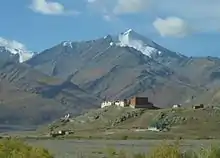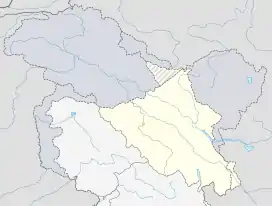Rangdum Monastery
Rangdum Monastery is a Tibetan Buddhist monastery belonging to the Gelugpa sect, situated on top of a small but steep sugarloaf hill at an altitude of 4,031 m (13,225 ft) at the head of the Suru Valley, in Ladakh. It is next to the tiny village of Julidok, and about 25 km from the 4,400 m (14,436 ft) Pensi La (pass), which leads into Zanskar.[1] The monastery was electrified using Solar Energy in June 2017 by Global Himalayan Expedition (GHE) [2]
| Rangdum Monastery | |
|---|---|
 Rangdum Monastery seen from the north | |
| Religion | |
| Affiliation | Tibetan Buddhism |
| Sect | Gelug |
| Location | |
| Location | Suru Valley, Ladakh, India |
 Location in Ladakh, India | |
| Geographic coordinates | 34°3′36″N 76°21′0″E |

History
According to an inscription the monastery was built by Gelek Yashy Takpa during the reign of King Tsewang Mangyul of Ladakh about 200 years ago.
Although it is physically in the Suru Valley, it is culturally part of Zanskar.[1]
Because one cannot count on crops being harvested due to the brief summer, both the village and the monastery depend on supplies, other than locally produced dairy, brought up the largely barren Suru Valley, or over the 4,400 metre (14,436 ft) Pensi La pass from Zanskar. The monastery was electrified using Solar Energy in June 2017 by Global Himalayan Expedition along with the nearby village of Shakma Karpo. It was the first time that the first two female engineers of the region trained by Barefoot College and GHE executed the project.
The monastery is home to about 30 monks and almost as many donkeys.[1][3] To ensure income for the nearby local communities, GHE has setup homestays in the villages, allowing travelers to visit the Monastery while experiencing an authentic culture in the homestays.

Footnotes
- Schettler, Margaret & Rolf (1981), p. 150.
- "Bringing light at 13,000 feet: Ladakh's first solar engineers provide off-grid energy access to one of the most remote area of the world | Barefoot College". 7 November 2017. Retrieved 18 October 2019.
- Rizvi (1996), p. 28.
References
External links
| Part of a series on |
| Tibetan Buddhism |
|---|
 |
| Wikimedia Commons has media related to Rangdum Monastery. |
